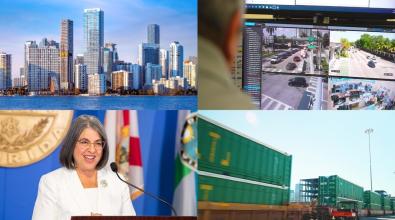 Read More
Read More
Cities are flexing their new procurement power

Courtesy City of Little Rock
Listen to This Article
Increased federal funding isn’t just spurring cities across the United States to make deep investments in infrastructure. It’s also prompting local leaders to think differently about how they can use their deepened purchasing power to quickly drive action on their cities’ priorities.
That’s why the Harvard Kennedy School Government Performance Lab (GPL), which is supported by Bloomberg Philanthropies, is tapping its Procurement Excellence Network (PEN), a group of 1,200-plus local leaders, to unearth the most creative procurement strategies taking root in cities. These include efforts to recruit new talent to procurement teams, to strengthen ties between procurement teams and others throughout city hall, and to more deeply engage elected officials in procurement-related opportunities.
Here’s a look at how these procurement advances can help local leaders everywhere.
Deploying creative staffing models to meet the moment.
Talent recruitment and retention represent challenges across every level of government, and city leaders are taking novel approaches to get on top of them. Procurement teams, however, are taking their own steps to ensure their cities can take full advantage of funding opportunities.
One such effort in Phoenix is an apprenticeship program that is helping the city turn around a 30-percent vacancy rate in its procurement shop. By opening positions to mid-career professionals—who are pivoting to procurement and still working on their three-year certification—the city isn’t only filling empty positions faster, it’s injecting its team with new ways of working.
“So many innovative PEN governments are rethinking organizational approaches by expanding the definition of a traditional procurement professional, which represents a vital new tactic, given the urgent need to fill vacancies,” Colin Erhardt, the assistant director overseeing the Procurement Excellent Network, says.
For example, it was the outside, previous-career experience of someone new to procurement that helped Phoenix open $25 million in landscaping contracts to a more diverse group of vendors with an interactive map making it easier for people to identify and apply for opportunities.
“I've only seen the positives in us opening [these jobs] to others,” says Toysha “T.J.” Jones Martin, chief assistant city attorney in Phoenix, who has also led the city’s procurement efforts.
Strengthening relationships throughout city halls.
Integrating procurement as a strategic function throughout their organization has been a priority of mayors for some time now. But many are fast-tracking this work as the runway for tapping federal dollars shortens.
“The reality is local government can’t successfully deploy these federal dollars without fostering improved cross-collaboration between program departments and central procurement,” Erhardt says. “Having procurement be a thought partner in every conversation will be crucial to clearing the path for effective deployment of programs and services.”
In Louisville, that includes the development of a dashboard that, when complete, will use city data to rank procurement projects—by their relevance to city operations and their potential for resident impact. Joel Neaveill, the city’s director of procurement, says this will accelerate his team’s work by aligning it with mayoral objectives and by helping city leaders better understand how procurement priorities are set.
Alignment is just one piece of the puzzle, though. That’s why Little Rock, Ark., is creating new opportunities for cross-collaboration throughout city hall with events like a “Procurement Day.” The event’s training sessions and small-group conversations are designed to put faces with names in the procurement department, so others throughout the city can see them as partners rather than roadblocks.
The approach is already helping streamline the process, according to Little Rock Procurement Manager Vitesh Patel. “Normally, it’s just, ‘Well, I sent it to procurement and I haven't heard back.’ Well, now we're getting to the point of [procurement staff saying], “Call us, we'll meet you out there’” in the field where infrastructure and other projects are on the move.
Engaging more closely with elected officials to modernize procurement processes.
Turbocharging their integration with department personnel is one thing. But procurement staff are also finding new ways to engage with city councils and other local elected officials outside the mayor’s office, which they say can make the difference between a successful project and one that gets stuck in the mud.
“Historically, procurement professionals have preferred staying behind the scenes, rarely engaging with elected officials unless formally obligated,” Erhardt says. “However, real systemic reforms can only happen by helping elected officials and other government leaders understand the strategic importance of procurement. We’re encouraging procurement officials to lean into proactive engagement with these leaders.”
In Nashville, the procurement team is working with local lawmakers to help them understand when processes aren’t working, so they can push for changes together.
Not so long ago, city contracts that involved architects or engineers had to be awarded to vendors on a list of those professionals that was pre-approved by the city council. Any change to that list—to reflect changes in the marketplace to diversify the pool—required the new contractor be vetted and approved by the council, which the procurement team saw as a roadblock that likely didn’t produce the best outcomes for residents, according to Zak Kelley, a special advisor for procurement innovation and strategy in the city.
So the team engaged in a concerted effort to push for change, meeting with professional organizations like the state Architects Board and holding stakeholder meetings with department personnel. Ultimately, they concluded that the antiquated process wasn’t just a hassle but that it threatened city goals by excluding qualified vendors and significantly delaying the awarding of contracts on priority projects.
Procurement staff brought their case to local lawmakers, who overhauled the process at their urging, giving the team more discretion in how they awarded contracts. “We said, ‘Well, why are we scared to engage them on this? Let's get in there. This is gonna make a material difference. Let's do that,’” Kelley says. “And it was a really good outcome.”
As GPL’s Erhardt emphasizes, innovations in local procurement teams are noteworthy at any time. But these efforts have the potential to drive exponential benefits to cities and residents—not only because they represent “the most innovative, forward-thinking work being done right now,” as he puts it, but also because they are positioning cities to make the most of the surge of federal dollars coming their way.

